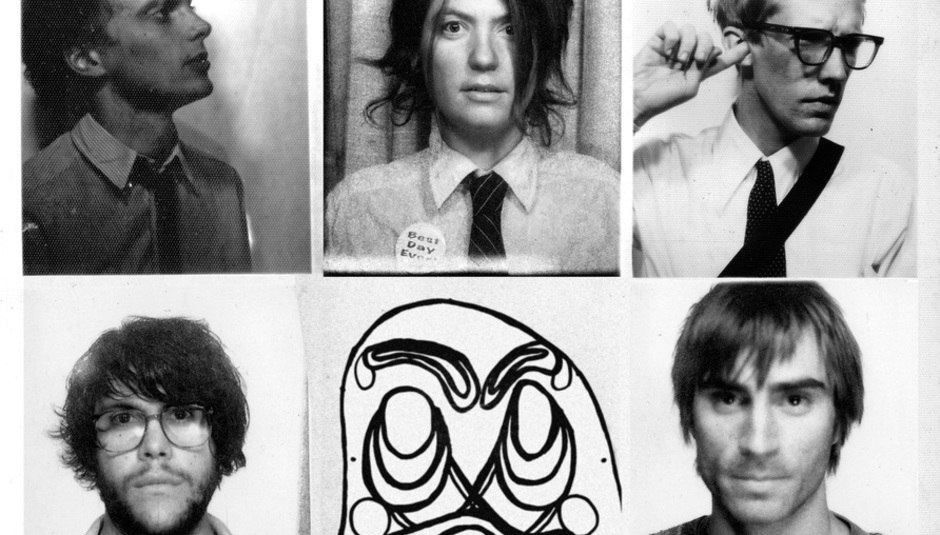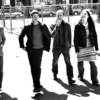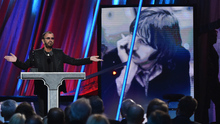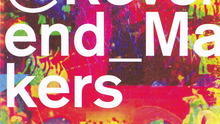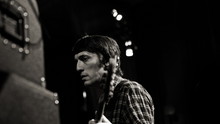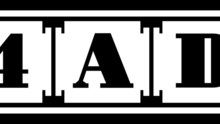Okay, okay, so we left it to part three to get onto the 'music' section of a record label interview, but Constellation is a pretty special case. Here we bring the final part of the transcript of Andrzej Lukowski's interview with founders Don Wilkie and Ian Ilavsky, conducted for a piece in the final issue of Plan B magazine.
Plan B: Ooooookay. The ‘Constellation sound’. Your early roster was undeniably quite heavy with the type of instrumental music that people tend to call ‘post-rock’. To what do you attribute this? And furthermore is your problem with the post-rock tag rooted in the fact the literal connotations are daft/pretentious? Or that it’s not a sound idea to try and homogenise that music?
CST: The music-making in Montreal in the mid-Nineties that excited and inspired us was first and foremost punk rock in spirit and practice, i.e. governed by a do-it-yourself ethic in the fullest and most committed sense, largely driven by untrained and/or self-taught musicians (or trained musicians who were trying to unlearn and escape their training!) and generally guided by an oppositional stance artistically, socially and economically.
At the same time, we found particular common cause with musicians who were sensitive to the risk of overreaching and/or being reductive on any of these fronts. We were drawn to musicians who had an analysis: who were politically sensitive and thoughtful, who felt instinctively that making 'art' or seeking self-expression and creative collaboration and cultural community needed to be forged from and anchored by critique and idealism in delicate and tender balance.
The only truly binding artistic and social ideas were self-sufficiency and autonomy fueled by the pooling of resources, shared labour and constructive co-dependence. The only binding political idea was TO HAVE AN ANALYSIS, to recognise that culture and economics were following a regressive and darkening logic on many levels, and to enact some sort of response to that beyond simple escapism and getting your kicks while you could. It was precisely not an identification based on genre or sound or style.
So for example, aesthetic experimentation for its own sake, or any tendency towards artistic hermeticism, was as distrusted as the notion that politically and socially committed punk rock had to follow overt or well-worn tropes, musically, culturally or otherwise. We fell into natural alliance with musicians who were exploring the fault lines between received and established genres, and who resisted received and established hierarchies of authorship, leadership, careerism, management, etc.
If that's a definition of post-rock, then so be it – if post-rock was meant to highlight an approach to music-making on all levels, not merely some (hopelessly broad) set of formal aesthetics, then we'd have been all for it. In which case it really had nothing to do with 'instrumental' music per se, and in fact would have been no more an aesthetic descriptor than a socio-political one.
This is precisely why we found ourselves railing against the post-rock tag almost as soon as it got stuck on Constellation – because by 1998 the term had entered such general currency and was being tossed around so lazily as to be rendered utterly banal. It was doing nothing to expand critical discourse about independent, experimental music in its potential for redefining and reorganising processes surrounding means of production and terms of engagement. Neither was it saying anything about anger or soul or hope or deconstruction and reconstruction with a deeper meaning or purpose.
Post-rock had become an empty signifier, a genre that could only fairly be said to encompass some caricature or straw man, a strictly aesthetic category that categorized nothing. It not only failed to say anything constructive about any particular work or group unfortunate enough to earn the label, but generally conspired against a more meaningful engagement with the specifics of any such work on aesthetic grounds (much less the larger productive forces or cultural positions that might be foregrounding it). With good reason, we read 'post-rock' as mildly to moderately pejorative and derogatory.
Of course all this coincided with a broader cultural trend, viz. the renewed proliferation of indie music of all sorts through the late Nineties – what will probably go down as the last golden age of independent labels, who filled every gap (and seemed to continually invent new gaps to then fill!) with stupendously diverse and interesting sounds while major labels preoccupied themselves with the threat of file-sharing and lawsuits against Napster. A pretty great time to be a dedicated music fan, as you could check out just about anything you wanted with P2P technology, get a handle on all manner of obscure and previously pretty damn inaccessible recordings, and buy really good sounding albums in lovely jackets by contemporary artists made in DIY studios on low budgets.
Meanwhile, music, lifestyle and fashion mags were similarly proliferating and trying to track all of this; music reviews got shorter, cramming as many thumbnail reviews as possible into the back pages. In a lot of these mags, one or two short paragraphs was the norm, and if you wasted the first paragraph spinning your wheels around the term post-rock, that was pretty much it. If we had a dollar for every review of a Constellation album that came out between 1999 and 2002 that exhausted most of its precious square inch of column space referencing Godspeed You! Black Emperor and foreshadowing 'another' post-rock record from the label, leaving literally a sentence to actually engage with the work itself, we'd be rich.
And in case this all sounds like sour grapes, ultimately it isn't. While the irony of suffering from one empty steamroller review after another tasted bitter indeed, it was pretty irrelevant in the grand scheme of things. Constellation was obviously both helped and hurt by the post-rock tag, It brought undeniable attention to our releases, and connected us with genuine fans who consistently engaged with and immersed themselves in the albums we put out. We carried on tons of email correspondence in those early years, generating some terrific dialogue about the extra-aesthetic themes we cared about, directly with articulate and interested fans and mostly micro-indie zinesters, student thesis writers, and fellow-travelers trying to get their own thing going. That pretty much meant it all.
Video: Godspeed You! Black Emperor: 'Storm' (live)
Plan B: I think it’s safe to say that Godspeed You! Black Emperor still stand as the act that first comes to mind when people think of Constellation. When did you first become aware of them? What were your first impressions, both musically and personally? Presumably their ethics/politics were a major appeal in signing them?
CST: We got to know members of the band in 1996, just as they were expanding into the large formation. Efrim was living in the Hotel2Tango loft space and was starting to put on shows there.
We started talking at first just to make sure we didn't work at cross-purposes (Constellation still being in performance space search mode at that time). We pretty much started attending H2T events right away and helped out up there however we could – monitoring the door, running the sound board, cleaning up. The band was still a somewhat rotating cast – I think the first time we saw them there might have been 14 players, and they played behind a slowly rotating crossbar stretched with canvas upon which the 16mm film loops were being projected. It was a wall of sound, amazing and powerful but much less differentiated than what they would rapidly evolve towards in the ensuing year.
Those early performances were closer to massive, immersive drone pieces, full off overtones and weaving lines and galloping drums, but wrapped in white and pink noise.
PB: There was a period in the late-Nineties/early Noughties (I’m particularly thinking of the NME cover) where it looked like something approaching a ‘popular’ breakthrough might occur with Godspeed. How was that period? Did it impact on the label at all?
It is fair to say that Constellation and Godspeed both felt the band had achieved popularity beyond all expectations. The notion of a further 'breakthrough' pretty much implied a commercial logic that was anathema to the band.
We believe the band broke through in the best possible way: on their own terms from beginning to end, without once having recourse to a manager or a lawyer or an accountant or a publicist, treated straight up and totally ethically by both Kranky and us, with an indie label profit split on record sales and recoupable costs kept very low since the albums required nominal marketing dollars.
They were absolute masters of their own success, they set their own agenda and their own limits every step of the way, they rocked very fucking hard right to the end and quietly dispersed and moved on to other things without fanfare.
PB: Clearly the old stereotype of the ‘Constellation sound’ no longer holds, but would you say there is there a particular type of artist? Compared to, say, Merge or Arts & Crafts you still harbour a large number of acts who utilise non-conventional instrumentation/song structures, and who have little likelihood of or desire to achieve chart success... is there a sense that you exist as an appropriate environment for acts of that ilk, in that you understand their needs better than other indies?
CST: A question that could have a very long and complicated answer but suffice to say that if 'understanding needs' equates in any way with being interested in artists and music that is not pre-destined and pre-determined to achieve chart access, then sure. But on that level, we’re no different than thousands of small labels. For more than that, the question is likely better asked of the artists themselves.
Video: Evangelista: 'Pissing' (live)
PB: When and why did you start looking outside of Montreal for your bands? Who contacted who in the cases of Carla Bozulich/Evangelista and Vic Chestnutt?
CST: To clarify, we've released records by bands outside of Montreal since our very early days. The first Do Make Say Think album was our fifth release and they have always resided in Toronto, which is about a five-hour drive from Montreal. Other Toronto projects (Polmo Polpo/Glissandro 70) followed before we released anything from further afield, and more (Sandro Perri/Eric Chenaux/Lullabye Arkestra) have followed since. So fairer to call our historical emphasis regional.
As with just about anywhere, the kinds of music being made here tends to go in cycles, and for a period of a couple of years, our existing regional roster kept us busy while new stuff that was happening in Montreal and Toronto was just not happening for us, whether due to timing, or because it didn't feel like stuff that would make a good fit for the label. We didn't go searching per se outside the region, but we had become more open to the idea of working with far-flung artists.
We first met Carla in the earliest days of Constellation. Sofa opened a few Geraldine Fibbers' shows on the east coast and Jessica (Silver Mt Zion) did some time as a touring member of the Fibbers. We maintained sporadic contact with her and Nels, and Carla decided at some point to come to Montreal to record a new record at the Hotel2Tango. She was without a label at the time and after hearing the recording, it made a lot of sense. We loved the music, and with a pile of musicians affiliated with Constellation featured on the recording, the association was not much of a stretch. It could not have been a more natural way to open the door for a geographically remote addition to the roster.
Likewise with Vic. Early records of his were among some of the first that we bonded over in the pre-Constellation days. New York filmmaker Jem Cohen, who we've been friends with since his work with Godspeed, has also been a friend of Vic's forever, and a massive fan of his work. It was his brainchild to bring Vic to Montreal to record with players here (along with Guy Picciotto from Fugazi).
North Star Deserter, the first record to come out of that collaboration, was not of interest to New West (Vic's record label at the time), and so it just fell into our laps like a precious gift. A second stunning record is just getting mastered, and a more satisfying collaboration we cannot imagine.
Other international projects followed: The Dead Science, a brilliant artrock trio from Seattle sent us an essentially finished little masterpiece, Villainaire, and have since blown us away as a live band repeatedly. Tindersticks (another very longstanding favourite of ours) began working with us when we licensed for North America their latest very wonderful album The Hungry Saw.
One thing all of these artists all have in common is having worked with multiple record labels throughout their careers, so at the very least, they all have some sense of what they want from a label relationship. Whether or not we're a good home for them is best left for them to assess, but we can say that we are definitely honoured to have them.
PB: Could you quantify the relationship between Constellation and Hotel2Tango as a recording space and Efrim Menuck as a producer? Do bands come to you wanting ‘that Efrim Menuck sound’?
CST: We became friends with Efrim just as Constellation was starting. He and a few others were starting to host live shows at the old Hotel2Tango space, and Godspeed was shape shifting into the large band it would become. The bands he has since been part of have made ten albums to-date for Constellation (a sixth of our catalogue), and he has been part of many others as an engineer and/or musician. He and Thierry Amar from Godspeed began setting up a recording studio at the old H2T in 1999 and by 2001 it was pretty full on, with a proper control room and tracking room. Howard Bilerman joined forces with H2T at this time, having previously run his own studio in town.
Constellation and the Hotel2Tango studio bought a building three years ago, which sits across the street from the old Hotel location (still in use as a multi-disciplinary space, with artist studios, two rehearsal rooms, a silkscreen studio and a guitar repair shop).
Constellation inhabits the upper floor of the new digs and the studio is on the ground floor (along with Harris Newman's Grey Market Mastering). Radwan Moumneh joined the H2T as an engineer when the move to the new locating took place.
Just to be clear: H2T is a completely separate entity, owned and operated by the aforementioned four engineers.
Constellation obviously has a close and long-standing relationship with the studio – without doing the math, we would guess that roughly 75 per cent of the records we've released have been recorded at the Hotel, by Efrim, Thierry, Howard, and/or Radwan. While we can sometimes help Constellation bands get access to what is a very busy studio, we mostly leave it to them to figure out who they want to work with. If they don't know, we can always give them samples of records recorded by everybody who works in the studio. It's important to understand that the studio works pretty non-stop, and the vast majority of groups recording there have nothing to do with Constellation. What they might ask for in terms of 'sound' is not really anything we're privy to.
Video: Clues: 'Perfect Fit' (live)
PB: Onto the new crop: Unicorns were a vastly loved band, but would not seem likely candidates for Constellation-hood. Or is that being narrow-minded? Anyway, how did Clues come to you?
CST: In our opinion, Clues is a perfect fit. We met Alden only after the Unicorns had disbanded, and that meeting came more as result of some of the social/political activism that he was involved with.
Having made a bit of a personal connection, and then knowing he was working on a project, Don saw an early show (with a different line-up) that definitely suggested some great musical ideas were flowing. We started talking and it eventually became clear (we think to both parties) that we might be good for each other.
We subsequently saw a show with what was mostly the current band configuration and we both loved it. More talking ensued, this time including Brendan and Nick and Lisa and Ben, and we collectively decided to go ahead. Because a lot of the recording that eventually made its way on to the record happened during the December holidays, Don was able to spend a large amount of time in the studio, which was incredibly fulfilling on a musical level, but also allowed some serious bonding to happen.
So, we can say without qualifiers, Clues are making music that is very exciting to us, they're making it in ways that make sense to us, their ways of going about being a band are ways we can get behind, and they are a seriously sweet group of people with sympathetic politics.
PB: So talk to me about your relationship with Sam Shalabi, whose record Against The Day you recently put out under the name Land Of Kush. I get the impression he is something of a pillar of the Montreal artistic community..?
CST: Your impression is correct. Sam is among the best-known, best-loved and most admired musicians in our corner of the community. He has played in countless local projects, some well-known outside the city (The Shalabi Effect) and others that might play a single gig every few years. All of the Shalabi Effect stuff and material under Sam's own name have been released on Alien8.
For the past few years, he has been composing for large ensembles, usually commissioned and performed a single time. These performances are always fantastic, and he has continued to raise the bar each time. We started to harass him a while ago to commit something to tape, but he has mostly chosen to perform a piece and move on.
In June of 2008, his orchestra (having taken on the name of Land Of Kush) debuted a new piece as part of Suoni Per Il Popolo, an annual festival that runs in Montréal throughout the month of June. The venue was at capacity, the 30-piece orchestra spilled off the stage and occupied the front third of the venue’s floor, and with Shalabi conducting and playing, the band delivered a truly mesmerising performance. And this time we were not rebuffed; Sam was into recording it, and the full orchestra membership was able and willing.
The result was Against The Day, a record we are incredibly proud to have released. Sam and another version of the band (Egyptian Light Orchestra) debuted yet another great piece later last year (at the 2008 version of Pop Montreal) that has also been recorded and will likely see the light of day early in 2010. We think this one has (many) legs.
PB: Elfin Saddle - a band who moved cross country from British Columbia at the opposite end of Canada - seem to have been gradually pulled to you as if by gravity... what drew you to them/them to you?
CST: Our relationship with these lovely people is still pretty fresh. We had each seen them on separate occasions in different spaces over the past year or so, and they charmed the pants of us. At that time, they were still relative newcomers to Montreal, having recently moved from Canada's west coast where Jordan and Emi first met (Emi was born and raised in Japan).
Their first record (Gigantic Mother/Wounded Child) as Elfin Saddle came out on a small and short-lived imprint called Kill Devil Hills, run by Dante DeCaro of Wolf Parade, another west coast denizen. When we found out they were looking for a new home, we invited them by for a chat and were left very inspired, not only by their sweetness, but also by their brilliant work as visual artists and film makers.
On their new record, they've upped the ante with the addition of Nathan Gage (Shapes & Sizes) on double bass, and Ringing For The Begin Again is a splendid affair.
You can find part one (History+Context) here and part two (Politics) here. This concludes the interview with Ian and Dom; something special extra may follow in the next few days, pending the interview subject's permission...

